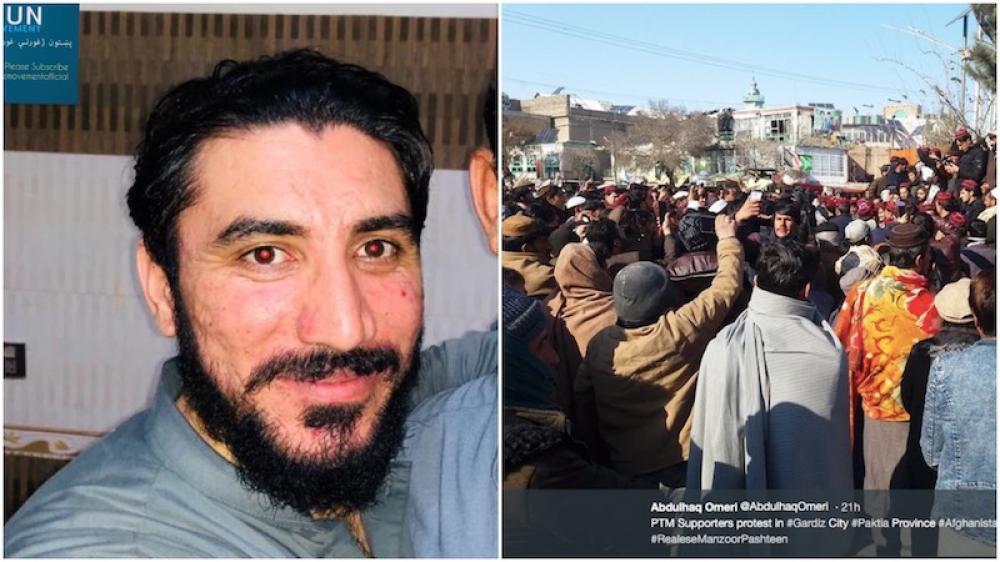Just Earth News | @justearthnews | 29 Jan 2020

Peshawar/JEN: Human rights groups and Pashtuns took to streets in Pakistan and Afghanistan demanding the release of Pashtun Tahaffuz Movement (PTM) chief and rights activist Manzoor Pashteen who was arrested arbitrarily on charges of sedition and sent to Peshawar's Central Jail on a 14-day judicial remand on Monday.
The young leader of the Pashtun human rights was arrested from Peshawar's Shaheen Town and then produced in a court under heavy security.
International media hails Manzoor as the man who dared Pakistan's army for its human rights abuses.
He is a leader of the Pashtun Tahafuz Movement (PTM), or the Pashtun Protection Movement, which had began as a social movement for ethnic Pashtuns' human rights trampled allegedly by Pakistan and its Army. The Pashtuns are based in Khyber Pakhtunkhwa and Balochistan.
The PTM speaks against the powerful Pakistan military and for the human rights of Pashtuns affected by Pakistan's war against the Taliban in its North-West. They thus faced repeated repression and arrests.
Formerly called the Mahsud Tahafuz (or Protection) Movement, PTM was founded in May 2014 by eight students at Gomal University, Dera Ismail Khan as an initiative for removing landmines from Waziristan and other parts of the former Federally Administered Tribal Areas, affected by the war in North-West Pakistan.
While peaceful but vocal protests broke out after the arrest of Manzoor Pashteen, PTM leader and MNA Mohsin Dawar on Twitter said: "This is our punishment for demanding our rights in a peaceful and democratic manner. Manzoor's arrest will only strengthen our resolve. We demand the immediate release of Manzoor Pashteen."
"... the State reminded us once again that our rights don't mean much as they didn't bother to create even flimsy grounds for our arrests. I was dragged along with other comrades of PTM and AWP including @IsmatShahjahan, @AmmarRashidT and many others," he posted about the treatment they were meted out for protests.
شمالی وزیرستان میران شاہ پریس کلب کے سامنے پختون تحفظ موومنٹ کا اختجاج جاری ہے #PTMWorldWideProtests#ReleaseManzoorPashteen pic.twitter.com/qFhKq9p7gR
— Sharif Pashteen (@Sharifpashteen1) January 28, 2020
As our freedoms are shrinking silence is not an option. The fight to win back our right to dissent, is a common cause that transcends ethnicities & beliefs. Speak up & be counted, your life means nothing if you don't have the freedom to disagree. -5 #PTMWorldWideProtests
— Mohsin Dawar (@mjdawar) January 28, 2020
According to Pakistan's Dawn quoting police, a case was registered against the PTM chief at the City Police Station in DI Khan on Jan 18 under sections 506 (punishment for criminal intimidation), 153-A (promoting enmity between different groups), 120-B (punishment of criminal conspiracy), 124 (sedition), and 123-A (condemning the creation of the country and advocating the abolishment of its sovereignty) of the Pakistan Penal Code.
According to the FIR, a copy of which is available with Dawn.com, Pashteen and other PTM leaders had attended a gathering on Jan 18 in DI Khan where the PTM chief had allegedly said that the 1973 Constitution violated basic human rights.
The FIR added that Pashteen also made derogatory remarks about the state, the report said.
Besides Manzoor Pashteen, many other PTM activists were arrested, said reports.
Protests broke out in Afghanistan capital Kabul too over the arrest as people demonstrated outside the Pakistan Embassy there.
Protests are also being organised in Europe and USA and among other countries worldwide.
Meanwhile, Amnesty International said Manzoor Pashteen has been arbitrarily detained for exercising his human rights to freedom of expression and peaceful assembly.
"He must be released immediately and unconditionally. #ReleaseManzoorPashteen," the global human rights body tweeted.
Manzoor Pashteen has been arbitrarily detained for exercising his human rights to freedom of expression and peaceful assembly. He must be released immediately and unconditionally. #ReleaseManzoorPashteen
— Amnesty International South Asia (@amnestysasia) January 27, 2020
According to Dawn, PTM is a rights-based alliance that, besides calling for the de-mining of the former tribal areas and greater freedom of movement in the latter, has insisted on an end to the practices of extrajudicial killings, enforced disappearances and unlawful detentions, and for their practitioners to be held to account within a truth and reconciliation framework.
PTM has been vocal against Pakistan's policies in the tribal belt, where "a massive operation against terrorists was conducted in recent times leading to large-scale displacement and enforced disappearances."
PTM's leaders who were elected to the National Assembly have been criticised by the ruling regime and the powerful Pakistan Army as being "anti-national" for demanding the release of individuals detained by authorities without due process.
.jpg)